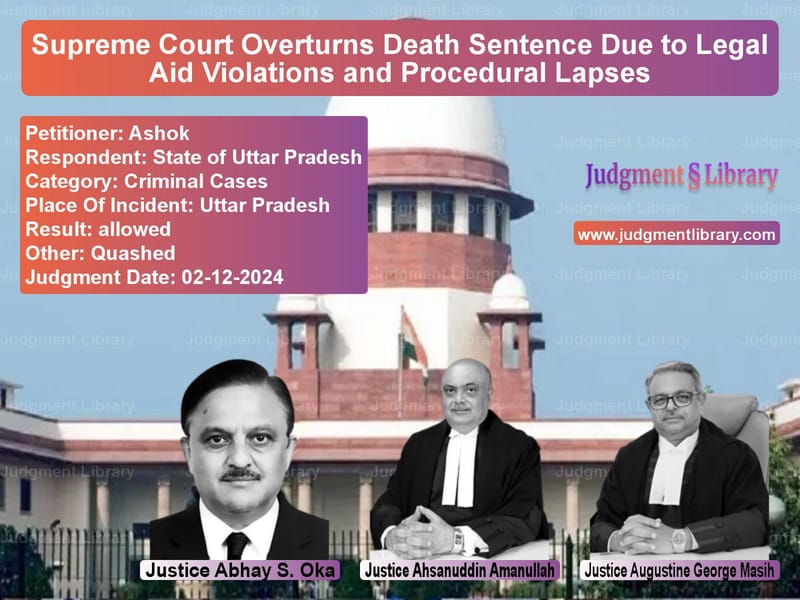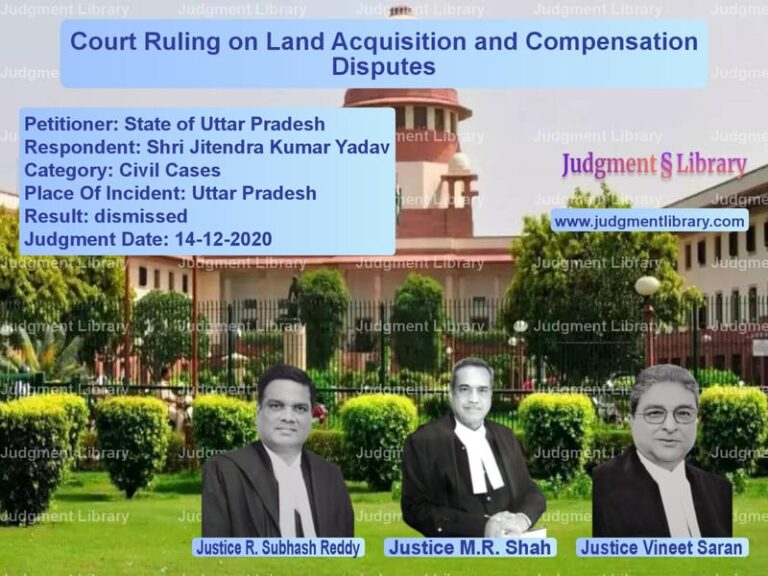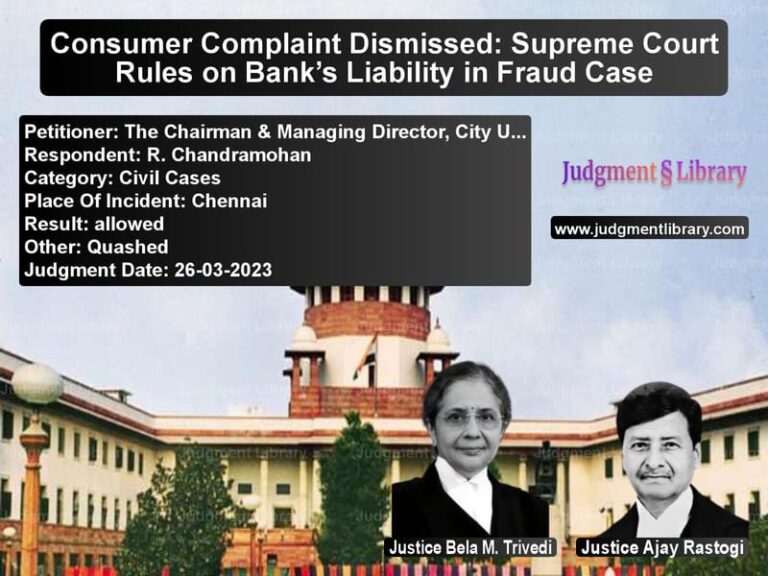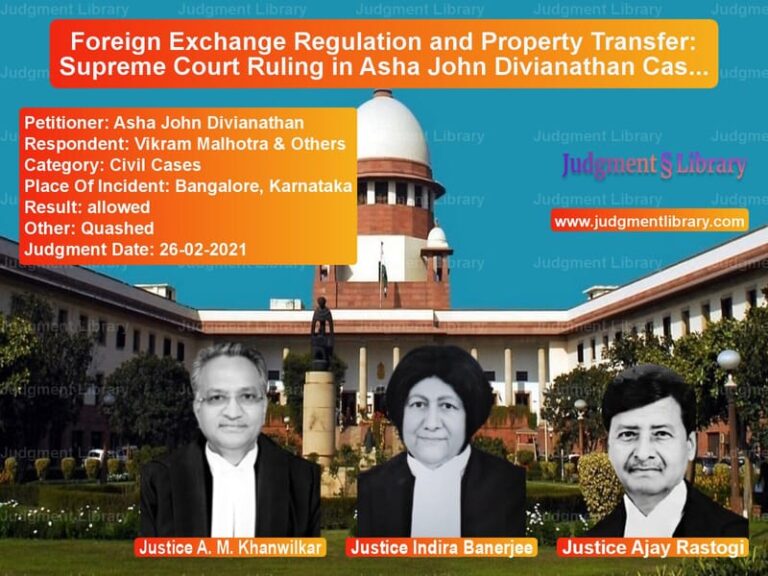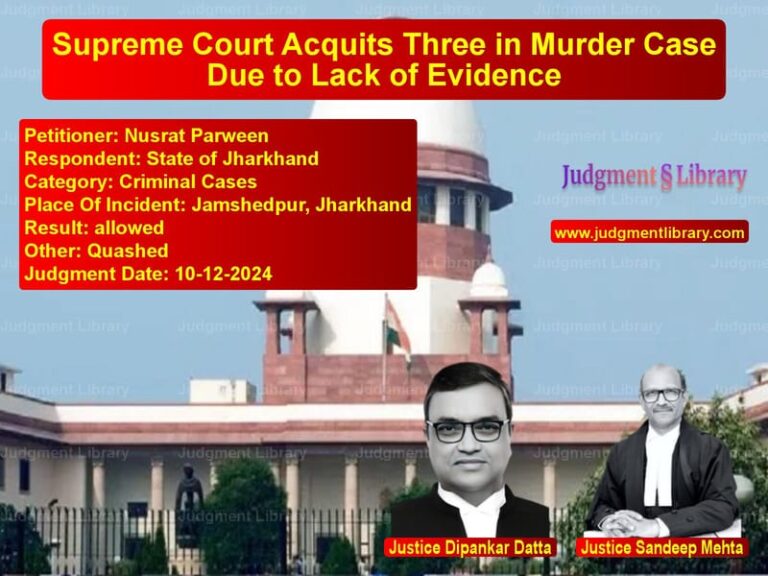Supreme Court Overturns Death Sentence Due to Legal Aid Violations and Procedural Lapses
The Supreme Court of India, in a landmark judgment in the case of Ashok v. State of Uttar Pradesh, overturned the conviction and death sentence of the appellant, citing serious violations of his right to legal representation and procedural lapses. This case underscores the fundamental principle that every accused is entitled to a fair trial, and any lapse in due process can lead to a miscarriage of justice.
Background of the Case
The case dates back to May 27, 2009, when a tragic incident took place in a rural area of Uttar Pradesh. A 10-year-old girl was allegedly raped and murdered by the accused, Ashok, who was a tubewell operator. According to the prosecution, the victim had gone with her seven-year-old cousin (PW-2) to graze goats near the tubewell. Feeling thirsty, she approached the appellant for water. The prosecution claimed that the appellant lured the child inside the tubewell cabin, assaulted her, and murdered her. PW-2 reportedly witnessed the crime and later informed the victim’s father (PW-1). Upon discovering his daughter’s dead body hidden under a haystack, PW-1 lodged an FIR against the appellant.
Trial Court Proceedings
On December 24, 2012, the Trial Court convicted Ashok under:
- Section 376 of the Indian Penal Code (Rape)
- Section 302 of the Indian Penal Code (Murder)
- Section 201 of the Indian Penal Code (Causing disappearance of evidence)
- Section 3(2)(v) of the Scheduled Castes and Scheduled Tribes (Prevention of Atrocities) Act
Based on the available evidence, the Trial Court imposed the death penalty, stating that the crime fell under the ‘rarest of rare’ category.
High Court Appeal
The accused challenged the conviction before the High Court. The High Court upheld the conviction but commuted the death penalty to life imprisonment for the remainder of his natural life, subject to remission by constitutional authorities.
Appeal Before the Supreme Court
The case was taken up by the Supreme Court in appeal, where several glaring deficiencies in the trial process were brought to light.
Arguments by the Appellant
The counsel for the appellant presented several arguments highlighting the flaws in the prosecution’s case:
- The primary witness (PW-2) was only seven years old at the time of the incident, and his testimony was inconsistent with the statements of PW-1.
- The prosecution’s recovery of the victim’s slippers and undergarments was questionable, as there were no independent witnesses to confirm the recovery.
- The forensic evidence failed to conclusively establish the involvement of the appellant.
- Most importantly, the accused was denied legal representation during crucial stages of the trial, violating his fundamental right to legal aid under Article 21 of the Constitution.
- The appellant’s statement under Section 313 of the Code of Criminal Procedure (CrPC) was recorded improperly, as key incriminating evidence was not put to him for his response.
Arguments by the Respondent (State of Uttar Pradesh)
The prosecution defended its case by arguing:
- PW-2’s testimony, despite minor inconsistencies, was reliable and directly implicated the appellant.
- The circumstantial evidence, including the recovery of the victim’s belongings, corroborated the case against the appellant.
- The High Court had already provided relief by commuting the death sentence to life imprisonment.
- The appellant had undergone a fair trial and was convicted based on the merits of the evidence.
Supreme Court’s Observations and Verdict
The Supreme Court identified multiple issues in the trial that rendered the conviction unsustainable:
- The accused was not represented by a lawyer at the time of framing charges.
- His statement under Section 313 CrPC did not include key incriminating evidence, thereby violating his right to present a defense.
- The legal aid lawyers provided to the accused were ineffective, and several crucial cross-examinations were conducted in their absence.
- The prosecution’s evidence had several inconsistencies, including the lack of forensic confirmation linking the accused to the crime.
- The Trial Court imposed the death penalty without ensuring the accused had adequate legal representation.
The Court concluded that these procedural lapses resulted in a miscarriage of justice and that the accused could not be held guilty beyond a reasonable doubt. The Court cited past judgments emphasizing that the right to legal aid is a fundamental component of Article 21 and cannot be overlooked.
Key Excerpts from the Supreme Court’s Judgment
“The failure to put material circumstances to the accused amounts to a serious irregularity. It will vitiate the trial if it is shown to have prejudiced the accused.”
“If legal aid is provided only for the sake of providing it, it will serve no purpose. Legal aid must be effective.”
“The right of the accused to defend himself in a criminal trial is guaranteed by Article 21 of the Constitution of India. He is entitled to a fair trial. But if effective legal aid is not made available to an accused who is unable to engage an advocate, it will amount to infringement of his fundamental rights.”
Based on these findings, the Supreme Court acquitted the appellant of all charges, stating that his conviction could not be sustained due to the numerous violations of his right to a fair trial.
Implications of the Judgment
The Supreme Court’s decision sets a significant precedent regarding the necessity of legal aid and proper procedural conduct in criminal trials. Key takeaways include:
- Courts must ensure that accused individuals, especially those facing severe charges, have competent legal representation.
- Failure to provide effective legal aid can result in the reversal of even the most serious convictions.
- Public prosecutors have a duty to assist in the fair conduct of a trial, including ensuring that all incriminating evidence is properly put to the accused.
- The decision reinforces that no conviction should be sustained if the trial process is flawed, regardless of the gravity of the allegations.
Conclusion
This judgment highlights the importance of procedural fairness in criminal trials. While crimes like rape and murder evoke strong emotions, the fundamental principle of justice must not be compromised. The Supreme Court’s decision serves as a reminder that every accused, regardless of the nature of the allegations, is entitled to a fair trial and competent legal representation. This case will likely influence future decisions, ensuring that courts adhere to due process and uphold the rights of the accused.
Petitioner Name: Ashok.Respondent Name: State of Uttar Pradesh.Judgment By: Justice Abhay S. Oka, Justice Ahsanuddin Amanullah, Justice Augustine George Masih.Place Of Incident: Uttar Pradesh.Judgment Date: 02-12-2024.
Don’t miss out on the full details! Download the complete judgment in PDF format below and gain valuable insights instantly!
Download Judgment: ashok-vs-state-of-uttar-prade-supreme-court-of-india-judgment-dated-02-12-2024.pdf
Directly Download Judgment: Directly download this Judgment
See all petitions in Bail and Anticipatory Bail
See all petitions in Custodial Deaths and Police Misconduct
See all petitions in Legal Malpractice
See all petitions in Judgment by Abhay S. Oka
See all petitions in Judgment by Ahsanuddin Amanullah
See all petitions in Judgment by Augustine George Masih
See all petitions in allowed
See all petitions in Quashed
See all petitions in supreme court of India judgments December 2024
See all petitions in 2024 judgments
See all posts in Criminal Cases Category
See all allowed petitions in Criminal Cases Category
See all Dismissed petitions in Criminal Cases Category
See all partially allowed petitions in Criminal Cases Category

